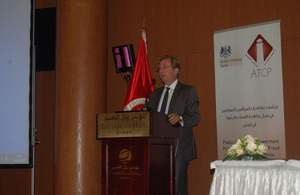The UK supports a free access to information in Tunisia
Freedom of Access to Information: Issues and Challenges of Implementation

The British Embassy in Tunis supported a conference on Freedom of Access to Information: Issues and Challenges of Implementation that took place in Tunis on Monday 30 September 2013. The conference is one element of the Embassy’s efforts to strengthen the expertise of public auditors in Tunisia, as part of its transparency and anti-corruption agenda. During the conference participants were exposed to both British and Slovenian expertise in the field of Freedom of Information, namely in the areas of dealing with information requests, data protection and classification and judicial treatment of conflicts related to access to information.
The Embassy is also supporting the Organisation for Cooperation and Economic Development (OECD) to work on the necessary legal framework in this area with the Governance and Anti-Corruption Ministry. Additonally the Embassy also works with the UNDP to provide technical advisory support to the newly established Independent Commission on Anti-Corruption.
The conference was organised by the Association Tunisienne des Contrôleurs Publics (ATCP), an association of public auditors that the Embassy has been supporting for the past two years. Two months ago, Francis Maude, Minister for the Cabinet Office responsible for government transparency and public sector efficiency and reform in UK, made an official visit to Tunis to underline the UK’s commitment to support implementation of Tunisia’s good-governance strategy. Mr Maude discussed during his visit Tunisia’s eligibility to join the Open Government Partnership (OGP) and the Tunisian participation to the forthcoming summit in London.
The British Ambassador to Tunis, Hamish Cowell, opened the conference with a speech reiterating the UK’s commitment to support Tunisia, especially since the post-Revolution period, the Ambassador said:
“One of the most important demands of all Tunisians is to end the corruption and opaque practices of the government. The UK has engaged with Tunisian organisations in a number of ways to share its own experiences on this important issue. Our Freedom of Information Act 2000 is regarded as one of the most important pieces of legislation in the UK this century. Our challenge was to implement it across all public services in five years only. I hope you find our experience useful as you face similar challenges.”
The conference was attended by Abderrahmen Ladgham, Minister in charge of Governance and Anti-Corruption and Graham Smith, Deputy Commissioner and Director of Freedom of Information at the Information Commissioner’s Office (IOC) and Urban Brulc, Legal advisor at the Slovenian Information Commissioner.
The UK’s support to this conference is part of the Arab Partnership Programme, which represents the UK’s strategic response to the political changes in the MENA region. It aims to support the democratic transition through political reforms and economic recovery.
For more information
· Check our Arab Partnership Page
· Contact the Arab Partnership Team
· Stay informed by liking our Facebook Page and following us on Twitter.